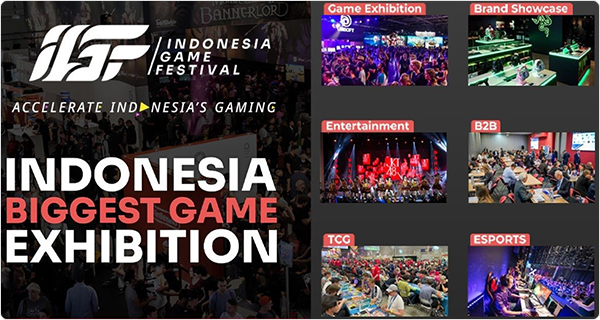Indonesia’s gaming industry is experiencing rapid growth. According to the Indonesian Game Association (AGI), the country’s gaming market is projected to generate between $1.5 billion and $2 billion in revenue by 2024. At the Indonesia Game Festival (IGF) 2024, data revealed that Indonesia is currently one of the largest gaming markets in terms of active players. Meanwhile, research from Statista estimates that Indonesia’s gaming market will grow from approximately $3.67 billion in 2024 to $5.5 billion by 2029, reflecting a compound annual growth rate (CAGR) of 8.45% over the next five years.

Indonesia’s Presence on the Global Stage
Indonesian game industry players are seizing opportunities to showcase their work at international gaming events such as Gamescom in Germany, Tokyo Game Show in Japan, and G-STAR in South Korea. These events provide a platform for Indonesian developers to introduce their games to a global audience. Participation in these international exhibitions not only aims to introduce products, form strategic partnership, and explore new business opportunities.
One of the industry’s success story is Agate, a game developer that has been established since 2009. Agate has launched over 10 games with more than 10 million downloads and 200,000 daily active users. The company has also developed games for major gaming consoles. In 2024, Agate achieved ISO/IEC 27001:2022 certification, underscoring its commitment to information security management.

Key Steps in the Game Localization Process for Indonesia
- Market Research and Cultural Analysis:
Before translation begins, developers must understand Indonesian gaming habits, cultural preferences, and the types of games that resonate with local audiences. Adjustments to storylines, characters, and visuals may be necessary to align with local expectations. - Language Translation:
Accurate and contextual translations are crucial. While Bahasa Indonesia is widely spoken, local dialects and slang should also be considered to enhance user engagement. - Cultural Adaptation:
Games should be culturally relevant, with humor, symbols, and references adapted to avoid confusion or offense. - User Interface (UI) and Gameplay Adaptation:
The UI must be adjusted to accommodate text expansion in translation. Additionally, certain gameplay mechanics may need modification to suit local gaming preferences. - Testing and Quality Assurance:
Localization testing ensures that translated text, UI elements, and gameplay function smoothly in the Indonesian context. - Post-Launch Support and Updates:
Providing Indonesian-language customer support and updates enhances player satisfaction and loyalty.
Challenges in Game Localization and How to Overcome Them

1. Language Nuances
Indonesian is a relatively easy language to translate, but it still has nuances that can confuse non-native speakers. In large games with multiple localizations, maintaining consistency between languages is essential. Character names and place names need to remain recognizable but understandable across languages. In franchises with established worlds, consistency in terminology and lore is especially important. The localization team works to standardize terminology and maintain the integrity of the game world, regardless of language. Meanwhile, slang is another challenge. Games often use everyday language to make the characters feel authentic, but this can backfire if the translation feels forced or unnatural. Localization requires understanding regional slang and adapting it in a way that maintains the character’s personality.
2. Cultural Differences
Cultural differences can affect the reception of certain elements in your game. A game may include content that is acceptable in one culture but problematic in another. For example, references to superstition, religious symbols, or political themes may require adjustment. On many games, certain interactions and scenes were modified to fit cultural expectations when the game was localized for different markets. The localization team worked closely with regional experts to avoid misinterpretations that could alienate players. Another aspect to consider is the differences in humor. Indonesian audiences tend to enjoy slapstick humor, which relies on physical comedy, loud action, and exaggerated movements. On the other hand, Western players are more inclined towards sarcasm and subtle irony. Translating Western sarcasm into the Indonesian market without adaptation can result in confusion and failure to engage players.
3. Technical Adaptations
Customizing your game’s UI and functionality to suit various devices and platforms in Indonesia can be challenging. Some languages, such as German, require more space due to text expansion, while Japanese kanji convey complex information in fewer characters and require UI changes. Another important consideration involves fonts, where specific fonts may be required for certain character sets, such as Adobe Arabic or Adobe Chinese. Additionally, the localization of the voiceover must be in sync with the character animations for good lip-syncing to get the much-needed immersion in the game. Overcoming these technical challenges allows developers to enable a quality user experience across multiple regions.
Take Your Game Global with Professional Localization
Well localized games tend to have higher engagement rates, as players feel more comfortable and invested in the content. This leads to increased player retention and greater long-term success in the market. By understanding the importance of game localization and how to implement best practices, developers can expand the global reach of games, increase player engagement, and maximize revenue potential.
If you’re looking to penetrate global markets with exceptional localization, it’s time to act! Whether you’re developing games, creating digital content or expanding your brand internationally, effective localization is key to engaging diverse audiences. By following the step-by-step process of game localization in Indonesia, and working with a professional localization service, you can unlock the full potential of this rapidly growing gaming market.
Are you ready to enter Indonesia’s thriving gaming market? Hansem Global’s expert Indonesian localization team provides an optimized gaming experience for local players. Contact us today for a consultation and take the first step toward global success!






